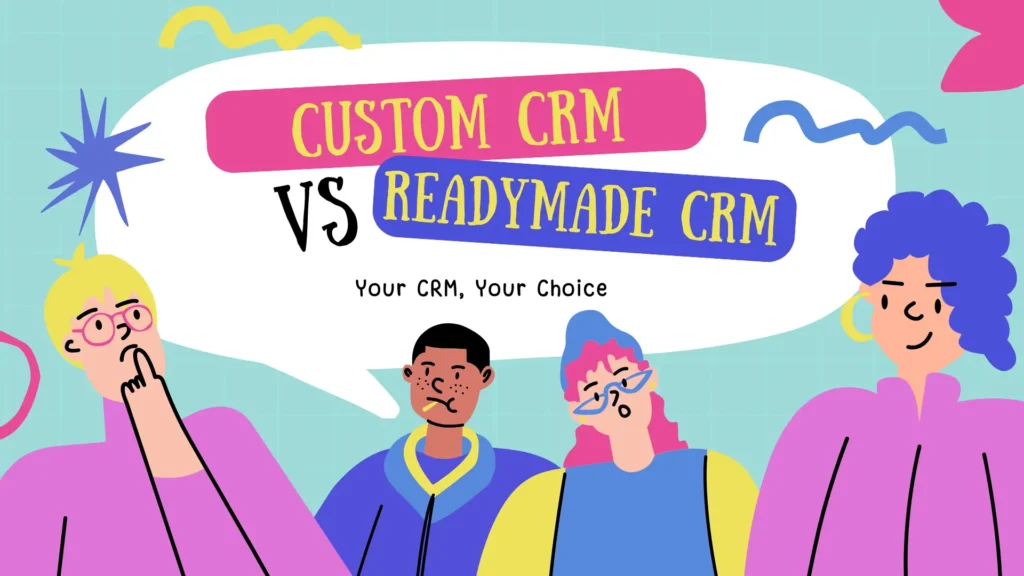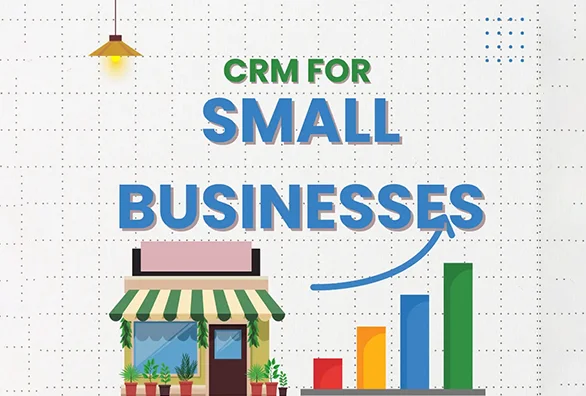In today’s world, if you’re running a business, it has become super essential for you to connect with your clients. Tracking your customers’ activities, managing relationships, and keeping your sales pipelines assembled can be overwhelming if a proper system isn’t integrated. So is the reason that many businesses incorporate CRM Systems. But the challenge is, when choosing one, you face a significant decision: Custom CRM vs Readymade CRM. Custom is designed just for your business; meanwhile, ready-made CRM is a ready-to-use software. But when choosing one, you face a significant decision: Custom CRM vs Readymade CRM
The most common question businesses face is: Should you invest in tailored solutions built just for your workflow or in ready-made ones that are easy to access and ready to use?
Both options offer the best benefits, but also come in combination with challenges. The article will walk you through the pros. Cons and key differences so you can certainly decide whatever option you want to.
Table of Contents
What is Custom CRM?
Custom CRM is a CRM based solution for businesses that seek personalization according to their demands and customers’ needs. They are typically built in-house by expert developers suitable for the particular business.
Benefits of Custom CRM
Flexibility
It is a fully customized software that can be adapted to any form your business requires. The personalization advantage of Custom CRM enhances its position above competitors as businesses seek outputs tailored to their needs. Every feature of Custom CRM is aligned with your every process.
Competitive Edge
When your business employs a reliable system, it will definitely grow with a competitive edge. Custom CRM holds your business ahead in competition as you can personalize it to the ongoing trends and customer demands.
Long-term ROI
One of the biggest advantages of Custom CRM is long-term ROI in comparison with the readymade CRM. While the initial investment can cost more, it does satisfy the later attributes such as
- No recurring subscription fee
- Improved efficiency
- No deduction for unused features
Smooth Integration
One of the biggest frustrations that businesses face nowadays with readymade CRMs is the hurdles in integrations. Custom CRM, however, is built with the features of seamless sync with existing tools, tailored API connections, and better user adoption.
Challenges of Custom CRM
Recurrent Maintenance Issue
Custom CRM requires continuous updates, support, and maintenance. As these ongoing chores are crucial for your business, they may also be time-consuming. Sometimes the systems may lag due to the ongoing updates or maintenance.
Higher Implementation Cost
Readymade CRMs can be initiated by a small monthly fee, but you may have to invest a huge cost for Custom CRM integration. They may cost your budget a lot because of the infrastructure charges, the development cost, or the customization effort. A custom CRM anywhere may cost between $30,000- $300,000 due to its complexities.
Longer Implementation Time
Due to the complicated nature of custom CRM, it may take a longer time for integration than the readymade one. As Custom CRM is entirely built from scratch so developing it will definitely cost more. Moreover, the deep customization and complex integrations result in time consumption. If your business is open for customer feedback cycles, it can also consume time for integration processes.
What is Readymade CRM?
A readymade CRM is a prebuilt CRM, also referred to as off-the-shelf CRM. It is developed by a third-party vendor for common business purposes. It offers basic features like your customer contact details and sales tracking.
Benefits of readymade CRM
Quick Implementation
Your readymade CRM may take two to three weeks to be integrated. Even some vendors offer you a plug-and-play option, making it easier for you to access as early as you want to. Many ready-to-use templates are also available for you to start immediately.
Low Upfront Cost
As the readymade CRMs are less complex, they don’t need a huge integration cost. The customization feature is not present, making it more finance-friendly. The simple integration makes the system cost less upfront.
Challenges of Readymade
Lack of Personalization
Readymade CRMs lack personalization. They are rigid and won’t let your business have access to customization features. As readymade CRMs are made for a broad market, not just for your business, so for customization they are generic as a whole. This means that you’ll have to adjust according to the software, not the software has to adjust according to your business.
Further Developments and Upgrades
With the passage of time, every system needs updates. Due to the less flexibility, it is harder for readymade CRMs to be updated specially on regular basis. The lack of development can make your business miss the competitive edge.
Vendor Dependency
Integrating the readymade CRM makes you locked into the vendor roadmap, service quality and their pricing strategy. If there is any removal, or addition of features from the vendor, you are left with no other choice than to adapt to whatever changes are being served.
Recurring Subscription Fees
Readymade CRM, although it has a low upfront cost, but ongoing monthly or yearly subscription fees that can become expensive. This can occur especially when your team grows and you need more premium features and user licenses. In many cases, the recurring subscription fee exceeds the upfront cost of Custom CRM.
Scalability Issues
A readymade CRM definitely will meet your needs at the initial level, but will lag as the business processes become complex. Scaling is often termed as expanding either in terms of cost or system, which can be disruptive for readymade CRMs.
Custom CRM vs Readymade CRM
When deciding between Custom CRM vs Readymade CRM, it is important for you to focus on the key differences, so that you can decide what the best option is.
Cost Structure
If you are willing to integrate Custom CRM, you may have to invest a high upfront cost, but the later subscription fees won’t bother you. Custom CRM also provides better Long-term ROI if you have a large team or if your processes are complex.
The readymade CRM demands a low upfront cost but will require later subscription fees. Also, in case your team increases or processes become complicated, you’ll have to invest more.
Implementation Cost
Development and incorporation of a Custom CRM can take a lot of time, as it has to be built from scratch. Meanwhile, readymade is already pre-built, so that it won’t take much time.
Customization
Tailored CRM is highly customizable for your processes, industries, and workflows, as clear from the name.
Readymade CRM lacks flexibility, and so does it lack customization. You have to make your processes flexible rather than the software.
Integration
Custom CRM is a complex system, so it can show complexities during the incorporation. It is designed in such a way that it seamlessly integrates with your existing systems.
Off-the-shelf CRM, on the other hand, is prebuilt software, so it won’t show you any difficulties with the integration. It works well with the standard system, but becomes problematic for complex processes.
Scalability
Tailored CRM is more scalable as it updates according to your needs. Prebuilt CRM, on the other hand, is less scalable and for the upgrades will cost you more financially.
Support and Updates
Custom CRM lets you control the updates and improvements, while a readymade CRM is under the control of the vendor, so the upgrading is also dependent on dealer.

How to Decide between Custom CRM and Readymade CRM
When selecting custom CRM vs readymade CRM, ask yourself these critical questions.
What is the size of your business?
The decision of Custom CRM vs Readymade CRM relies on the size of your business. If your business is small-scale, integrating a readymade CRM will be the best option. On the other hand, if you a running a complex business on a large scale, custom CRM is the right option.
What is your budget?
If you are willing to initiate your business immediately, prebuilt CRMs will be the best choice as it costs cheap. But, if you have a better, complex business to start and also have the finances to afford a high upfront cost, you should incorporate a custom CRM.
Either you have industry-specific needs or not?
If your business is generic, like e-commerce or retail, you can go with a readymade CRM. If your business is industry-specific like finance or healthcare, opting custom CRM is a great step.
How soon do you need it?
The readymade CRM is the perfect choice if you need the system to run immediately, as it takes less implementation time. If you don’t aim to start immediately, you can let the custom CRM take its integration time.
Conclusion
Deciding between a Custom CRM vs Readymade CRM finalizes with your need to initiate period, your size of business, growth stage, and your long-term vision. A readymade CRM is ideal if you need an affordable, immediate, and reliable solution. A custom CRM is best if you want a flexible system with seamless integration and long-term ROI. The key to selecting is beyond the finance, asking yourself which system is more efficient and will deliver the best result for over next decades. After analyzing the pros and cons of both CRMs, you can decide which one satisfies your standards and needs more.

